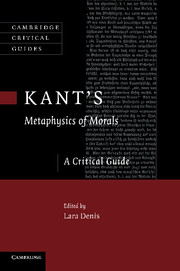Book contents
- Frontmatter
- Contents
- Notes on contributors
- Acknowledgements
- List of translations and abbreviations
- Introduction
- 1 Kant's Metaphysics of Morals: the history and significance of its deferral
- 2 Reason, desire, and the will
- 3 Justice without virtue
- 4 Kant's innate right as a rational criterion for human rights
- 5 Intelligible possession of objects of choice
- 6 Punishment, retribution, and the coercive enforcement of right
- 7 Moral feelings in the Metaphysics of Morals
- 8 What is the enemy of virtue?
- 9 Freedom, primacy, and perfect duties to oneself
- 10 Duties to and regarding others
- 11 Duties regarding animals
- 12 Kant's Tugendlehre as normative ethics
- Bibliography
- Index
2 - Reason, desire, and the will
Published online by Cambridge University Press: 10 January 2011
- Frontmatter
- Contents
- Notes on contributors
- Acknowledgements
- List of translations and abbreviations
- Introduction
- 1 Kant's Metaphysics of Morals: the history and significance of its deferral
- 2 Reason, desire, and the will
- 3 Justice without virtue
- 4 Kant's innate right as a rational criterion for human rights
- 5 Intelligible possession of objects of choice
- 6 Punishment, retribution, and the coercive enforcement of right
- 7 Moral feelings in the Metaphysics of Morals
- 8 What is the enemy of virtue?
- 9 Freedom, primacy, and perfect duties to oneself
- 10 Duties to and regarding others
- 11 Duties regarding animals
- 12 Kant's Tugendlehre as normative ethics
- Bibliography
- Index
Summary
Much attention has been devoted to Kant's famous doctrine of autonomy, the proposition that morality finds its source in the will's self-legislation, depending neither for the content of its principle nor for its motivating power on any source, natural or transcendent, outside the will and its power of self-rule. But Kant also advances another striking proposition about the will, that it is nothing but practical reason. Though less extensively investigated, this idea is at least as important, both in its own right and for the light it throws on other parts of his ethics, including his doctrine of autonomy, which can seem unduly voluntaristic if not appreciated in its practical-cognitivist setting. According to tradition, the will is rational desire. Kant too understands the will in terms of reason and desire, but his way of combining these notions in his conception of a practical application of reason accounts for much of what is distinctive in his moral philosophy.
This chapter examines Kant's mature conception of the will, as presented in the Introduction to the Metaphysics of Morals. Kant approaches this conception from a definition of the faculty of desire. But before doing that or indeed anything else, he makes a few remarks about the system of philosophical rational knowledge within which the metaphysics of morals is situated. Though somewhat fragmentary, these remarks recall the account he offered at the outset of the Groundwork of the Metaphysics of Morals – the work that, as its title announces, lays the ground for the metaphysics of morals.
Information
- Type
- Chapter
- Information
- Kant's Metaphysics of MoralsA Critical Guide, pp. 28 - 50Publisher: Cambridge University PressPrint publication year: 2010
Accessibility standard: Unknown
Why this information is here
This section outlines the accessibility features of this content - including support for screen readers, full keyboard navigation and high-contrast display options. This may not be relevant for you.Accessibility Information
- 18
- Cited by
